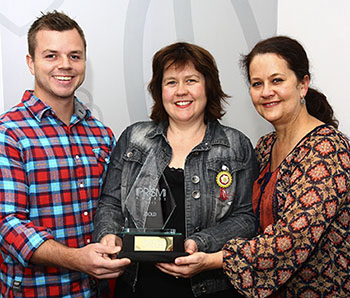
Stefan Lotter, Leonie Bolleurs and Lacea Loader. All three are from the Departement of Communication and Brand Management at the UFS.
Photo: Hannes Pieterse |
The University of the Free State, takes pride in the gold PRISM Award (from the Public Relations Institute of Southern Africa) for the B Safe Take Action safety campaign that has been rolled out on the campus since 2013 by the Department of Communication and Brand Management.
The campaign earned the Von H Brand Provocateur gold award in the internal communication category.
“The UFS is the only tertiary institution to receive a gold award. The award is a great honour for the department, considering the cream of South African public relations took part in the competition, and the standard was naturally very high. It was also a feather in the cap for us that the uniqueness of the campaign received national recognition from our peers in this manner, said Ms Lacea Loader, Director: Communication and Brand Management at the UFS.
The university is responsible for about 32 000 students and 4 000 members of staff on its three campuses: the Bloemfontein and South Campuses in Bloemfontein and the Qwaqwa Campus in the Eastern Free State. It is of cardinal importance for the university that its students, staff, and assets are safe.
Apart from safety measures that have been implemented by the UFS Protection Services, the B Safe Take Action campaign has also been rolled out on the three campuses of the UFS. The campaign supports the safety strategy of the university. It is aimed at developing a culture of safety awareness in students and staff alike. The purpose of the campaign is for staff and students to take ownership of their own safety. In addition, it creates awareness of the safety measures that are in place at the UFS.
The campaign has been rolled out on various communication platforms. These include placards, pamphlets, lamp-post advertisements, an advertisement board, emails, and messages on student communication portals such as Blackboard, the UFS web and intranet, social media, information boards in the campus parking areas and on the pedestrian walkways as well as messages on refuse bins around the campus. “The fact that a variety of communication platforms has been deployed, the striking design and character of the messages, and the number of target audiences that have been reached further contributed to the success of the campaign,” said Ms Loader,
The campaign also received a merit award from the International Association for Business Communication (IABC). The award will be presented on 15 June 2015 in San Francisco, USA.